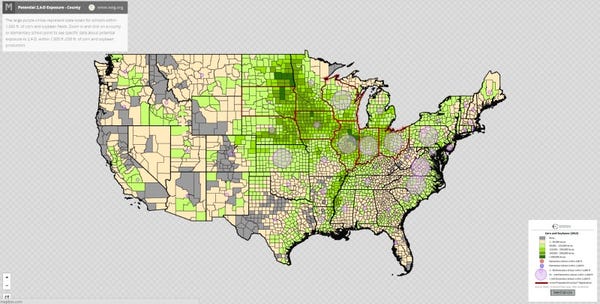As Dow AgroSciences awaits the EPA's OK to sell its new glyphosphate and 2,4-D herbicide, organizations explore its potential impact on humans, the environment and the farming industry.
October 13, 2014

On Sept. 16, the U.S. Department of Agriculture released its decision to permit chemical manufacturer Dow AgroSciences to sell its new genetically engineered corn and soybean seeds. This highly controversial ruling is a critical piece to Dow’s plan to bring a new weed killer, “Enlist® Duo,” to market.
The new weed killer proposed by Dow is a combination of glyphosphate (the active ingredient in Monsanto’s “RoundUp®” weed killer) and the toxic herbicide 2,4-Dichlorophenoxyacetic acid (2,4-D). The new GE seeds would be resistant to it. Without permission to sell the weed killer, there is no market for the seeds.
That brings us to the critical tipping point: Dow is now awaiting the EPA’s decision on whether it will be permitted to sell Enlist Duo.
Human and animal health
With this background, a panel of experts at Natural Products Expo East 2014 weighed in on 2,4-D: Scott Faber, vice president of government affairs for Environmental Working Group; Dr. Doug Gurian-Sherman, senior scientist and director of sustainable agriculture at the Center for Food Safety; Mary Ellen Kustin, legislative/policy analyst at EWG, and Michael Hansen, senior scientist at Consumer Union.
They shared some of the copious amounts of research demonstrating the toxic nature of 2,4-D—not just to weeds but to humans, animals and the environment. This chemical defoliant was first introduced in 1946, so there has been ample opportunity to study its effects.
According to the panel, human exposure to 2,4-D has been linked to non-Hodgkin’s lymphoma, Parkinson’s disease, birth defects, reproductive and immune system problems, neurodevelopmental toxic effects and thyroid problems. In particular, research has also indicated that Enlist Duo could pose even more significant health threats to children 12 and under.
Members of the panel also urged the EPA to factor into its decision the proximity that many farms have to schools, which could potentially leave children at risk to exposure from herbicide drift. Below (click to enlarge), EWG has illustrated the number of U.S. elementary schools located within 1,000 feet of corn and soybean fields proposed by Dow to use Enlist Duo in the future, if approved.

USDA estimates that if the EPA approves Enlist Duo, use of 2,4-D across the U.S. could more than triple by 2020, exposing farmers, their families and nearby communities to eight times more of the toxic chemical than today.
Superweeds
Beyond the health implications of allowing the herbicide to be sprayed on fields across the country, the panelists all agreed that Dow’s creation of a new toxic herbicide blend, and the GE seeds to withstand it, is just another step in the “pesticide treadmill.” As they did with RoundUp, weeds will become resistant over time to the new chemicals, and “superweeds” will become an even greater problem to farmers than they are today.
The expectation that there will always be another herbicide around the corner to “bail out” the country’s agriculture industry is one that has become engrained in this generation of farmers and certainly in the chemical companies. However, the panelists urged that this approach is futile, false and shortsighted.
Natural alternatives proposed
The panel put forth the alternative solution that funding should instead be applied to developing natural breeding changes for the crops themselves, taking advantage of the diversity already available in the plant gene pool. Complex crop rotations, planting of cover crops and manual weeding are estimated to require 30 percent more work but yield 12 percent higher net returns without GE. Furthermore, the money spent would stay in the farming communities to pay for labor rather than going to big chemical companies.
The experts noted that this approach could accomplish the same ultimate goal of weed suppression, while protecting against erosion, reducing pollution, and reducing our exposure to toxins in the environment.
To learn more and to sign EWG’s petition to the EPA urging them to deny Dow Chemical’s application for approval of Enlist Duo, visit the EWG website.
About the Author(s)
You May Also Like




